Faculty

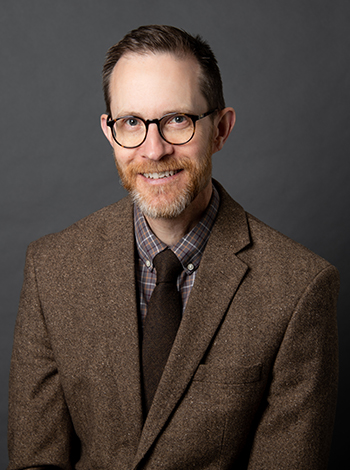
Bio
I am a Licensed Psychologist and Board Certified Behavior Analyst working with children, adolescents, young adults, and families to address a range of mental health and behavioral concerns that interfere with living a valued life including anxiety, OCD, disruptive behavior disorders, ADHD, ASD, mood disorders, and intellectual/developmental disabilities. I received my B.A. in Psychology from Colby College, earned my M.S. in Applied Behavior Analysis at Northeastern University, and my Ph.D. in Educational Psychology at the University of Minnesota where I also completed a postdoctoral fellowship in Leadership Education in Neurodevelopmental and Related Disorders (LEND).
Expertise
- Anxiety
- OCD
- Disruptive behavior disorders
- ADHD
- Autism spectrum disorder
- Mood disorders
- Intellectual/Developmental disabilities
Administrative Assistant
(for academic support only)
Teneshia Collins
coll1148@umn.edu
In the Media
- 2023: Featured in this article titled, “Strategic planning process in the Division of Child and Adolescent Mental Health creates a vision for the future."
- 2022: Featured in this article titled, “Using an evidence-based, flexible approach to treating young people with OCD.”
- 2022: Dr. Moore is the focus of this article titled, "Newest MIDB faculty member enjoys opening doors and giving hope to his adolescent patients".
Research Summary
My research interests center on the sustainability of evidence-based interventions in naturalistic conditions and include shared decision-making in complex clinical situations, factors that enhance adherence to interventions outside the clinic setting, and measurement tools and technology that connect patients’ lived experiences to clinical encounters.
Teaching Summary
I have enjoyed teaching and supervision throughout my career, and currently serve on doctoral committees involving research on the impact of technology on treatment adherence and the tailoring of interventions for caregiver-mediated regimens in outpatient settings.
Clinical Summary
Through clinical roles in inpatient settings, outpatient clinics, and family homes, my perspective is grounded in person- and family-centered principles, contextual behavior science, and positive psychology. My focus is simultaneously on the person seeking treatment and the systems in which they live, in pursuit of success for the individual and long-term sustainability of a higher quality of life. My greatest joys as a clinician emerge from partnerships with my patients that illuminate and strengthen the threads between values, actions, and meaningful outcomes in their lives.
Education
Fellowships, Residencies, and Visiting Engagements
Licensures and Certifications
Honors and Recognition
Professional Memberships
Selected Publications
Selected Presentations
Contact
Address
Masonic Institute for the Developing Brain, 2025 E River Pkwy, Minneapolis, MN 55414
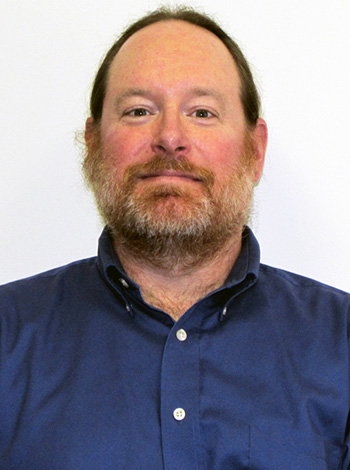
Bio
I received my BS in physics here at the University of Minnesota and my MS and PhD in nuclear physics at the California Institute of Technology in Pasadena, California. I completed a postdoctoral fellowship in the Medium Energy Physics group at Argonne National Laboratory in Lemont, IL, and then completed my medical physics residency at the Mayo Clinic in Rochester, MN.
I am a medical physicist with a research interest in applying novel magnetic resonance imaging methods to help understand the structural and functional differences in the brains of clinical populations. I am a member of the International Society for Magnetic Resonance in Medicine.
Within the University of Minnesota, I am a member of the 3T operations committee, which sets policy for the use of the 3-Tesla systems at the U’s Center for Magnetic Resonance Research (CMRR). I am also responsible for quality assurance monitoring of the 3T systems at CMRR and am available as a consultant to members of the 3T community. I am a Co-Investigator or collaborator on more than 140 unique ongoing or completed imaging studies involving more than three dozen principal investigators within the Department, two dozen principal investigators from other departments in the Medical School and University, and a dozen multicenter studies involving dozens of Universities from across the country.
Expertise
- Design, implementation, acquisition, and analysis of research MRI protocols in the study of brain structure and function
Administrative Assistant
(for academic support only)
Natasha Hampton-Anderson
nhampton@umn.edu
In the Media
- 2022: Coauthor of a study featured (although not named) in this MIDB article: "First Study to Evaluate Neurobiological Predictors of Interpersonal Psychotherapy for Depressed Adolescents".
Research Summary
Applying advanced MRI methods to better understanding structural and functional differences of the brains of clinical populations relative to controls. Developing MRI scanner quality assurance methods to quantify MRI scanner performance. Developing improved methods for performing Multi-center MRI experiments.
Education
Fellowships, Residencies, and Visiting Engagements
Honors and Recognition
Selected Publications
Selected Presentations
Contact
Address
Department of Psychiatry & Behavioral Sciences, F282/2A West Building, 2450 Riverside Avenue South, Minneapolis, MN 55454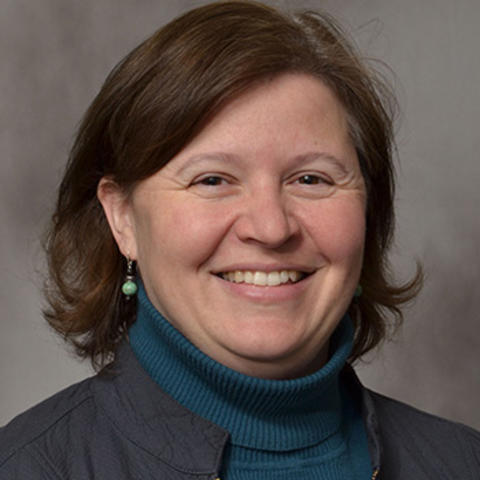
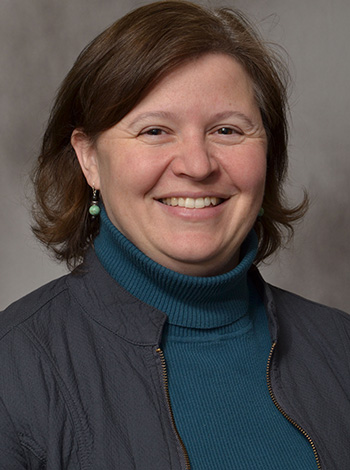
Bio
I received my BS in child psychology from the University of Minnesota. I completed an MA in psychology from Antioch University in Seattle, WA; and then a second MA and a PsyD in clinical psychology from the Minnesota Professional School of Psychology at Argosy University in Eagan.
I am a child and adolescent psychologist with a focus on psychosis risk identification and early intervention. I am particularly interested in psychosocial interventions, including psychotherapy and cognitive training.
Within the University, I train and supervise psychology graduate students and postdoctoral associates. I also provide didactics and therapy supervision to psychiatry residents and child and adolescent psychiatry fellows. I teach graduate-level courses on psychopathology and developmental psychopathology.
In the department, I am the assistant Child & Adolescent Psychiatry Fellowship Director and the Psychotherapy Director for the Child/Adolescent Psychiatry Fellowship.
Most recently, I received the 2020 Minnesota Psychological Association's Outstanding Graduate Faculty in Psychology Award.
Expertise
- Psychosocial interventions
Administrative Assistant
(for academic support only)
Molly Jokimaki
jokim004@umn.edu
Research Summary
Dr. Murray's research interests include psychosis risk identification and early intervention. Dr. Murray is particularly interested in psychosocial interventions, including psychotherapy and cognitive remediation.
Teaching Summary
Dr. Murray trains and supervises psychology graduate student and post-doctoral associates. She also provides didactics and therapy supervision to psychiatry residents and child fellows. She teaches graduate level course on psychopathology and developmental psychopathology.
Clinical Summary
Dr. Murray is a licensed Psychologist in Minnesota. She heads a specialty clinic for those at risk for psychosis.
Education
Fellowships, Residencies, and Visiting Engagements
Licensures and Certifications
Honors and Recognition
Professional Memberships
Selected Publications
Selected Presentations
Contact
Address
Department of Psychiatry & Behavioral Sciences, F282/2A West Building, 2450 Riverside Avenue South, Minneapolis, MN 55454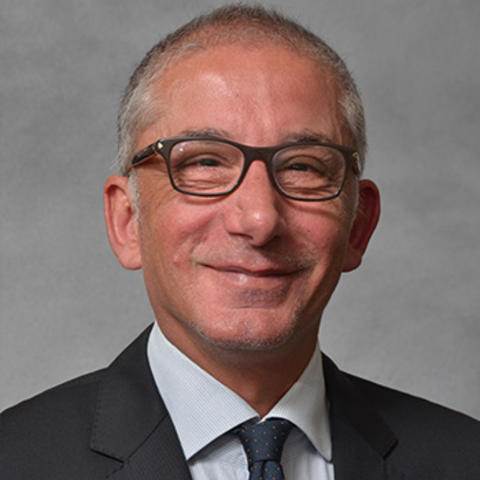
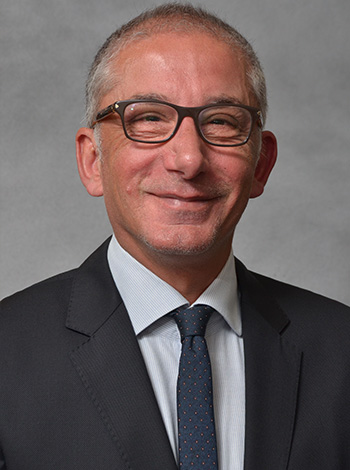
Bio
I received my Medical Degree from Saint Joseph University in Lebanon. I then completed an internship in Psychiatry at L’Institut Paul Silvadon, a Lacanian day hospital, and Hopital Charles Foix, both in Paris, France. I moved to Houston Texas in 1993 as a resident in Psychiatry at Baylor College of Medicine. I also attended the Houston-Galveston Psychoanalytic Institute’s psychodynamic psychotherapy course. I later joined the Medical University of South Carolina (MUSC) in 1997 where I completed a research fellowship in Functional Neuroimaging and Psychopharmacology and a Master of Science in Clinical Research. I was a faculty member from 1999 to 2011 with a specific focus on research in mood disorders and brain stimulation. From Summer 2011 to Spring 2017, I was the Chair of the Department of Psychiatry at the American University of Beirut Medical Center (AUBMC) where I helped develop the department's clinical, educational, and research portfolio.
My scientific interests lie in translational research of mood dysregulation and depressive disorders. My unique expertise is in functional neuroimaging and brain stimulation across various modalities [Transcranial Magnetic Stimulation (TMS), Vagus Nerve Stimulation (VNS), Prefrontal Cortical Stimulation (PCS), Deep Brain Stimulation (DBS), Electroconvulsive Therapy (ECT) and Focally Electrically Administered Seizure Therapy (FEAST)]. I have also conducted basic research and collaborated on health economic studies.
Within the medical school, I am the Fellowship Director of the MnDrive Neuromodulation Medicine Fellowship. I am also the executive vice chair for the department.
In addition to my scientific and academic contributions, I have been a strong advocate for the parity of mental health care coverage in Lebanon. I co-founded Embrace, a Non-Profit Organization to fight the stigma associated with mental illness and provide financial support for patients who cannot afford the cost of their treatments. Embrace launched the first Suicide Prevention Help Line in the Middle East.
Professional outreach and public service is also a key focus of my career. I am also a full member of the American College of Neuropsychopharmacology. To date, I have presented both nationally and internationally at over 70 conferences. I have received several awards including the NARSAD Independent Investigator Award and the Developing Scholar Award at MUSC.
Expertise
- Transcranial magnetic stimulation (TMS)
- Vagus nerve stimulation (VNS)
- Epidural prefrontal cortical stimulation (EpCS)
- Deep brain stimulation (DBS)
- Electroconvulsive therapy (ETC)
- Focally electrically administered seizure therapy (FEAST)
Administrative Assistant
(for academic support only)
Molly Jokimaki
jokim004@umn.edu
In the Media
- 2022: Featured in this Scientific American article titled, “What Is Vagus Nerve Stimulation For?”.
- 2022: Featured in this Minnesota Daily article titled, “UMN researchers to lead global study on impacts of vagus nerve stimulation".
Research Summary
Dr. Nahas's scientific interests lie in translational research of mood dysregulation and depressive disorders. His unique expertise is in functional neuroimaging and brain stimulation across various modalities [Transcranial Magnetic Stimulation (TMS), Vagus Nerve Stimulation (VNS), Epidural prefrontal Cortical Stimulation (EpCS), Deep Brain Stimulation (DBS), Electroconvulsive Therapy (ECT) and Focally Electrically Administered Seizure Therapy (FEAST)]. He has also conducted basic research and collaborated on health economic studies. He received funding from various sources, notably the National Institute of Mental Health, National Alliance for Research in Schizophrenia and Depression (NARSAD) and the Hope for Depression Research Foundation (HDRF).
Teaching Summary
Dr. Nahas's areas of teaching involve mood disorders; neuromodulation; and empathy.
Clinical Summary
Dr. Nahas's clinical interests involve treatment-resistant mood disorders; anxiety disorders; neuromodulation; and insight-oriented dynamic psychotherapy
Education
Fellowships, Residencies, and Visiting Engagements
Honors and Recognition
Professional Memberships
Languages
Selected Publications
Selected Presentations
Contact
Address
Department of Psychiatry & Behavioral Sciences, F282/2A West Building, 2450 Riverside Avenue South, Minneapolis, MN 55454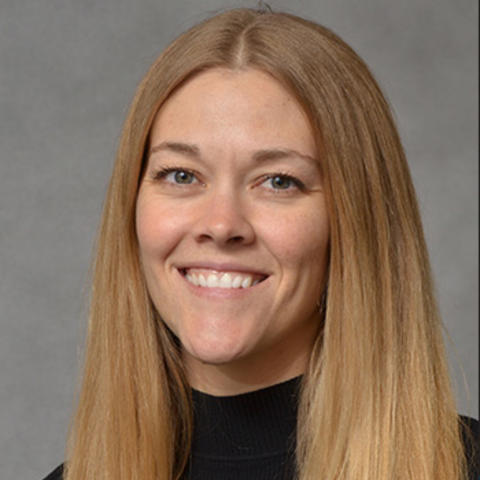
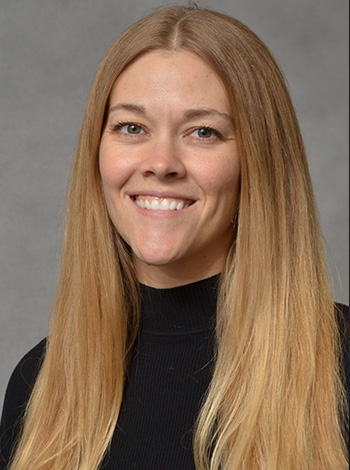
Bio
I received my BS in biology from Cal Poly Pomona, CA; completed my PhD from UC Irvine in 2010 in anatomy and neurobiology, and my postdoctoral training in bioinformatics and multivariate statistics at UC San Francisco. I became a jointly appointed Assistant Professor in the Department of Psychiatry & Behavioral Sciences and the Institute for Health Informatics at the University of Minnesota in 2017.
The overarching purpose of my lab is to understand and treat trauma. Research in my lab utilizes a multidisciplinary approach, merging the fields of neurobiology, psychiatry, and data science to identify more precise "bio-types" of trauma psychopathology than traditional diagnostic criteria, and potential novel targets for treatment. I use established and emerging machine learning methods with multi-modal data spanning a diverse range of diagnostic categories for neuropsychiatric disorders.
Other areas of focus in my lab are dedicated to psychedelic neuroscience research and drug policy reform. I have been collecting data through an anonymous online survey to assess the benefits and risks of ayahuasca use in naturalistic settings to treat symptoms of trauma. I am also conducting prospective clinical research into the neurological mechanisms of altered states of consciousness, currently with the drug psilocybin, to understand how such drug-induced experiences promote neuroplasticity.
My teaching interests focus on two main areas: The first is related to applied multivariate statistics and machine learning for precision medicine. The second is related to the neurobiology of emerging psychedelic-assisted therapies.
Expertise
- Health informatics
- Neurotrauma
- Psychedelic neuroscience; the therapeutic potential of hallucinogens
- Criminal justice reform regarding drug use
Administrative Assistant
(for academic support only)
Teneshia Collins
coll1148@umn.edu
In the Media
- 2023: Quoted in this New York Times article titled, “Minneapolis Mayor Loosens Enforcement of Psychedelics,” and in this WCCO radio interview titled, “Minneapolis allows for the use of psychoactive plants such as mushrooms”.
- 2022: Featured in this MPR interview titled, "Could psychedelics be the future of mental health?"
- 2022: Featured in this KARE 11 TV interview titled, "Shroom boom: Studies show 'magic mushrooms' can relieve severe depression".
Research Summary
Dr. Nielson is a neurobiologist and data scientist working at the intersection of informatics and psychiatry to understand the neurobiological mechanisms of mental health disorders that follow trauma, including PTSD, depression, addiction and schizophrenia. She brings her expertise in neuroscience, big-data and precision medicine techniques to the University for data-driven discovery of clinically relevant models of maladaptive behaviors, with an interest in researching and developing novel therapies to treat the root causes of trauma.
Teaching Summary
Dr. Nielson's areas of teaching expertise revolve around two primary domains. The initial area pertains to the application of multivariate statistics and machine learning within the realm of precision medicine. The second area delves into the neurobiology underlying emerging psychedelic therapies.
Clinical Summary
Dr. Nielson's clinical interests include neurological disorders (e.g. traumatic brain injury and spinal cord injury) and mental health disorders (e.g. post-traumatic stress disorder, depression, addiction, and schizophrenia)
Education
Licensures and Certifications
Honors and Recognition
Professional Memberships
Selected Publications
Selected Presentations
Contact
Address
Department of Psychiatry & Behavioral Sciences, F282/2A West Building, 2450 Riverside Avenue South, Minneapolis, MN 55454

Bio
I received my MBBS (Bachelor of Medicine, Bachelor of Surgery) from the University of Nigeria and have a background in Family Medicine. I completed my MPH in Maternal and Child Health, Psychiatry residency, and Child and Adolescent Psychiatry fellowship, here at the University of Minnesota.
I am a Board-Certified Child and Adolescent Psychiatrist who is committed to providing compassionate, patient-centered, and culturally competent care for children and adolescents with various mental health challenges such as Depressive disorders, Attention Deficit/Hyperactivity disorders, Anxiety disorders, Trauma, and Stressor - related disorders within various levels of care.
I am an Assistant Professor within the department and have clinical and research interests in psychopharmacology, cultural psychiatry, and global mental health (awareness, disparities, and care delivery). I am also the co-founder of both the UMP Child and Adolescent Psychiatry Bridging Clinic and the UMP Transitional Age Youth (TAY) Clinic.
Expertise
- Depressive disorders
- Attention deficit/hyperactivity disorders
- Anxiety disorders
- Trauma
- Stress-related disorders
Administrative Assistant
(for academic support only)
Teneshia Collins
coll1148@umn.edu
Education
Fellowships, Residencies, and Visiting Engagements
Licensures and Certifications
Honors and Recognition
Professional Memberships
Selected Presentations
Contact
Address
Masonic Institute for the Developing Brain, 2025 E River Pkwy, Minneapolis, MN 55414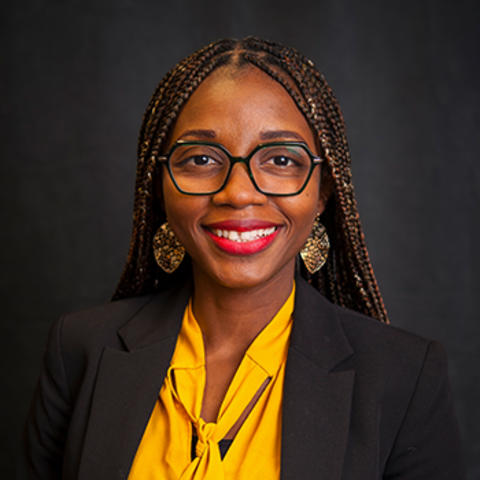
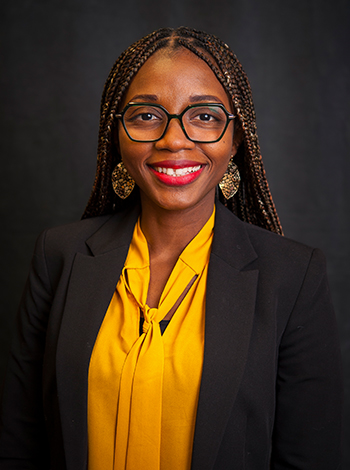
Bio
I am an Assistant Professor, Associate Residency Program Director, and Adult & Reproductive Psychiatrist in the Department of Psychiatry & Behavioral Sciences. I earned my MBBS degree from the College of Medicine University of Ibadan in Nigeria. I also hold a Master of Public Health from the University of Minnesota(UMN). I completed my psychiatry residency training at UMN and served as the Chief Resident.
I am passionate about reproductive psychiatry, leadership in academia, medical education, and building inclusive communities for trainees. In my clinical practice, I strive to center and amplify my patient’s voices. Within my work, I hope to contribute to reducing the gaps existing in perinatal mental health care.
One of the highlights of my job is working with trainees and learners. In my educational leadership role, I work on curriculum & didactics development and building sustainable systems for resident mentorship.
Administrative Assistant
(for academic support only)
Teneshia Collins
coll1148@umn.edu
In the Media
- 2023: Featured in this article titled, “Reproductive psychiatry gives new faculty member a unique focus.”
- 2023: Featured in this article titled, “Common themes emerge as members of the department think about Women in Medicine Month".
- 2023: Helped write this post for The Educational Commission for Foreign Medical Graduates’ blog titled, "Supporting International Medical Graduates in Minnesota".
Licensures and Certifications
- Minnesota State Medical License
- Diplomate, American Board of Psychiatry and Neurology
Education
Honors and Recognition
Professional Memberships
Selected Publications
Selected Presentations
Contact
Address
Department of Psychiatry & Behavioral Sciences, F282/2A West Building, 2450 Riverside Avenue South, Minneapolis, MN 55454
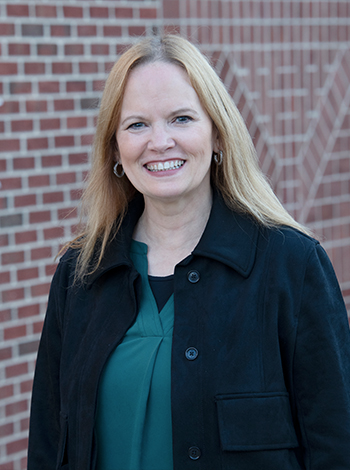
Bio
After receiving my BA in Psychology from Yale University, I attended the University of Minnesota where I received my PhD in Clinical Psychology. I completed my predoctoral clinical psychology internship at the Yale School of Medicine. My NIH-funded research focuses on examining novel approaches to treating eating disorders by targeting the psychological and neurobiological factors that maintain these conditions. I am especially interested in identifying the role of emotion in eating disorder maintenance, as well as innovative approaches to clinical assessment. I serve as the Program Director of our multisite T32 Midwest Regional Postdoctoral Training Program in Eating Disorder Research. In addition, I work as a clinician in our Interventional Psychiatry Program where I provide psychotherapy to individuals with mood, eating, and anxiety disorders.
Expertise
- Behavioral interventions
- Psychotherapy
- Adult psychopathology assessment/diagnosis measures (e.g. SCID) for psychiatric disorders
- Eating disorders (e.g. EDE)
Administrative Assistant
(for academic support only)
Molly Jokimaki
jokim004@umn.edu
In the Media
- 2023: Featured in this article titled, “Celebrating the many ways that psychologists help us".
- 2023: Featured in this Medical School article titled, “Talking eating disorders with U of M,” to commemorate National Eating Disorders Week, February 27-March 5.
- 2023: Featured in this article titled, “Common themes emerge as members of the department think about Women in Medicine Month".
Research Summary
Eating disorders: Specifically treatment outcome, assessment, and diagnosis
Clinical Summary
Eating disorders
Education
Honors and Recognition
Professional Memberships
Selected Publications
Selected Presentations
Contact
Address
Department of Psychiatry & Behavioral Sciences, F282/2A West Building, 2450 Riverside Avenue South, Minneapolis, MN 55454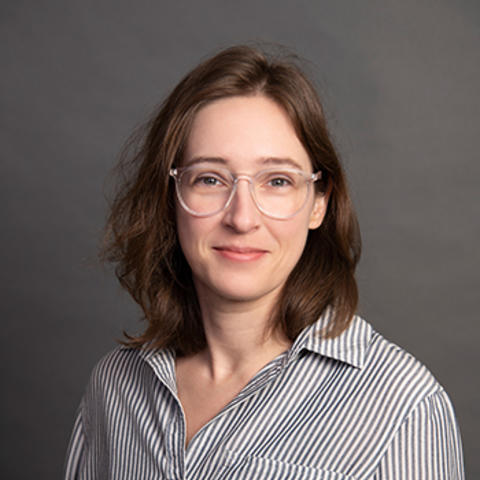
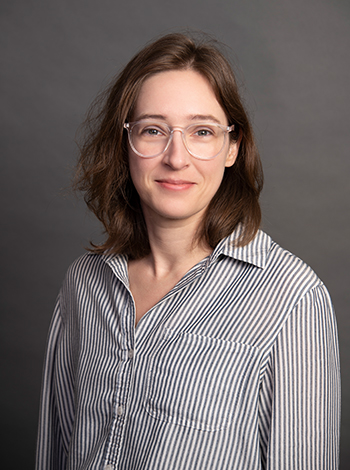
Bio
I am an Associate Professor in the Department of Psychiatry & Behavioral Sciences and the Residency Program Director. I completed my residency at the University of New Mexico in Albuquerque, New Mexico, where I was Chief Resident. After completing my residency, I became the Associate Program Director of the Iowa Medical Education Collaborative Psychiatry Residency Program, now known as the MercyOne Psychiatry Residency Program. I earned my DO at Des Moines University in Iowa, and my BA from St. John’s College-Santa Fe, also in New Mexico. In 2022, I won the Society of St. Luke’s Award from MercyOne for providing compassionate care and being a servant leader.
Most recently, I was medical director at the MercyOne Psychiatry Resident Clinic in Des Moines, IA, and supervised second, third, and fourth-year residents. My current clinical focus will be on the resident portion of the M Health Fairview Riverside Clinic in Minneapolis.
Administrative Assistant
(for academic support only)
Shelly Slominski
slomi001@umn.edu
Education
Fellowships, Residencies, and Visiting Engagements
Licensures and Certifications
Honors and Recognition
Selected Presentations
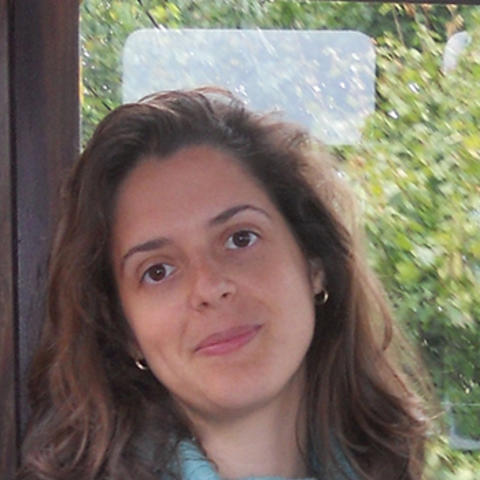
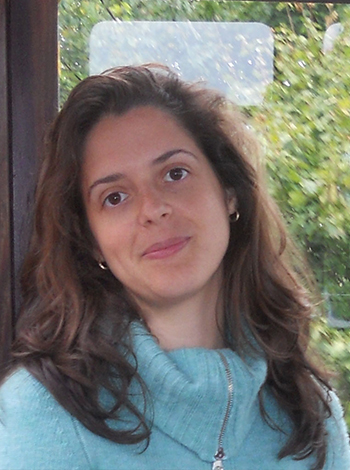
Bio
Karina Quevedo, PhD, LP, is a tenured Associate Professor in the Department of Psychiatry & Behavioral Sciences. She directs the Health and Emotions in Adolescent Trajectories laboratory (HEAT lab). Dr. Quevedo completed her doctoral graduate training at the University of Minnesota Institute of Child Development (ICD) and her postdoctoral T32 training at the University of Pittsburgh Western Psychiatric Institute and Clinics. She has received a BA in Psychology from the University of Havana, Cuba, and a MA in counseling psychology from the University of St. Thomas, MN. Dr. Quevedo’s research interests span typical and atypical pathways of emotional development; brain, physiological, and hormonal markers of child and adolescent adaptation; the long-term impact of adverse experience; and adolescent psychopathology. She has further interests in neuromodulation approaches to treatment-resistant depression (TRD) and suicide attempts in youth and adults. Dr. Quevedo trains graduate and undergraduate students as both emerging clinicians and scientists and mentors post-doctoral junior scientists.
Expertise
- fMRI; how to study processes of emotion and social cognition
- Typical and atypical pathways of emotional development
- Adolescent depression
- Psychopathology
Administrative Assistant
(for academic support only)
Tenisha Collins
coll1148@umn.edu
Research Summary
- Typical and Atypical Pathways of Emotional Development: http://www.ncbi.nlm.nih.gov/pubmed/19144221 Brain, Physiological and Hormonal Markers of
- Child and Adolescent Adaptation: http://www.ncbi.nlm.nih.gov/pubmed/22383860 http://www.ncbi.nlm.nih.gov/pubmed/18037012 http://www.ncbi.nlm.nih.gov/pubmed/20027622
- Long Term Impact of Adverse Experience: http://www.ncbi.nlm.nih.gov/pubmed/24552550 http://www.ncbi.nlm.nih.gov/pubmed/16903808
- Adolescent Depression and Psychopathology: The neural basis of aspects of self-knowledge, self-understanding and social cognitions are strongly linked to the course and morbidity associated to pediatric depressive disorders and risks for the illness during the adolescent transition.
Our laboratory has collected functional magnetic resonance (fMRI) data while teens think about- and see themselves while in the scanner. We are currently finishing data processing on three neuroimaging tasks that tap into self-knowledge and social interaction as well as diffusion tension imaging. Graduate students interested in clinical neuroscience are welcome to contact us at queve001@umn.edu for collaboration in writing manuscripts, data analyses, and learning about how to use fMRI to study basic processes of emotion and social cognition.
Education
Fellowships, Residencies, and Visiting Engagements
Honors and Recognition
Professional Memberships
Selected Publications
Selected Presentations
Contact
Address
Department of Psychiatry & Behavioral Sciences, F282/2A West Building, 2450 Riverside Avenue South, Minneapolis, MN 55454
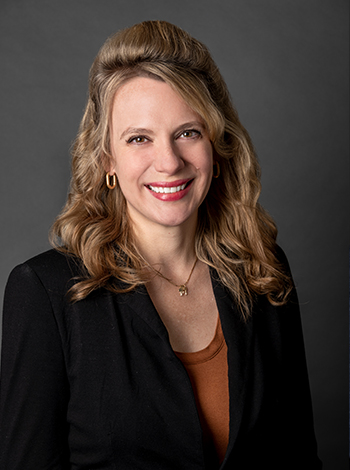
Bio
I am a child psychologist with an interest in adolescent depression and psychotherapy at the Department of Psychiatry & Behavioral Sciences. I received my BA in psychology from the University of Wisconsin in Eau-Claire, graduating summa cum laude. I received my MA in counseling psychology from Bethel University in St. Paul, MN. I completed my PsyD in counseling psychology at the University of St. Thomas in Minneapolis, MN, and then completed a postdoctoral fellowship in clinical psychology and research in the Child and Adolescent Mood and Anxiety Disorders Program here at the University of Minnesota.
I provide clinical services to children, adolescents, and adults. I also provide psychotherapy to parents with their own mental health concerns and parents of children experiencing mental illness. I am trained in Interpersonal Psychotherapy for depressed adolescents (IPT-A) and Cognitive Behavioral Therapy (CBT), including Exposure and Response Prevention.
My research interests include developing and implementing effective treatments for adolescent depression, maternal mental health, and promoting positive parenting practices. I am a co-investigator for the RADLab (Research in Adolescent Depression), which aims to advance understanding of the biology of mood disorders in adolescents and to test how investigational treatments may work to restore health in young people.
Within the University of Minnesota Medical School, I provide training and supervision for clinical psychology graduate students and psychiatry residents and fellows.
Expertise
- Psychotherapy
- Parent-based interventions to address disruptions in parent-adolescent attachment
- Adolescent psychopathology
- Parental mental health
Administrative Assistant
(for academic support only)
Molly Jokimaki
jokim004@umn.edu
In the Media
- 2022: Coauthor of a study featured (although not named) in this MIDB article: "First Study to Evaluate Neurobiological Predictors of Interpersonal Psychotherapy for Depressed Adolescents".
Research Summary
Dr. Reigstad's research interests include the development and implementation of evidence-based interventions for adolescent depression, maternal mental health and maternal depression, and positive parenting practices. Dr. Registad's research is focused on the interpersonal processes implicated in the link between parental depression and child and adolescent depression, and associations between improvement in parents' depression and their children's psychopathology. She also conducts research on the interpersonal context of depression, and she is interested in the impact of parent-child attachment relationships on child and parent functioning.
Teaching Summary
Dr. Reigstad provides training and supervision for clinical psychology graduate students and psychiatry residents and fellows in the University of Minnesota Medical School.
Clinical Summary
Dr. Reigstad is a Licensed Psychologist in Minnesota and provides individual psychotherapy and psychological assessments in the Child & Adolescent Anxiety and Mood Disorders Clinic. She provides clinical services to children, adolescents and adults. She provides psychotherapy to parents with their own mental health concerns and parents of children experiencing mental illness.
Dr. Reigstad is trained in Interpersonal Psychotherapy for depressed adolescents (IPT-A) and Cognitive-Behavioral (CBT), including Exposure and Response Prevention.
Education
Fellowships, Residencies, and Visiting Engagements
Professional Memberships
Selected Publications
Selected Presentations
Contact
Address
Masonic Institute for the Developing Brain, 2025 E River Pkwy, Minneapolis, MN 55414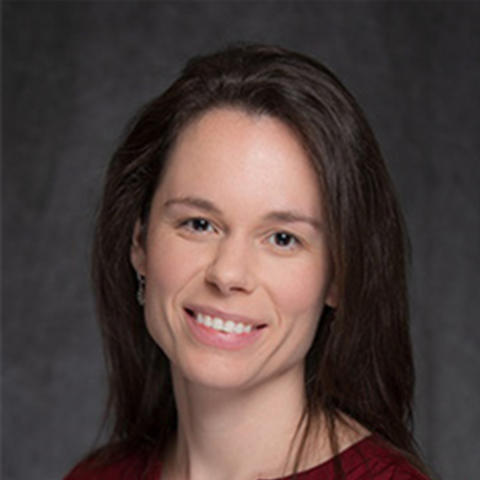
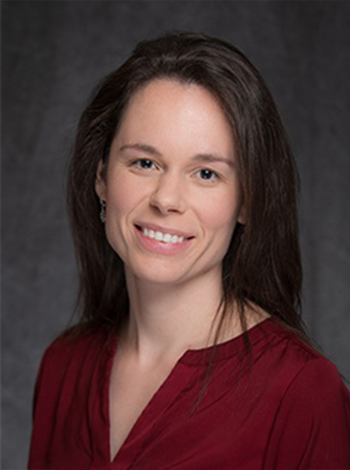
Bio
I am a clinical psychologist who specializes in the assessment and treatment of individuals with substance use and comorbid psychiatric disorders. In addition to individual therapy, I facilitate a weekly Relapse Prevention Group based on cognitive-behavioral principles. Within the Department, I train and supervise psychology doctoral students and psychiatry residents.
I received my BA in Liberal Studies from the University of Notre Dame, IN. I completed both my master's and PhD in clinical psychology from Duke University, NC. I further completed a postdoctoral fellowship focused on substance use disorders from Brown University/Providence VA Medical Center, RI.
My research focuses on alcohol and cannabis co-use, opioid use disorder, and psychosocial interventions for substance use disorders.
Expertise
- Mood and anxiety disorders
- Cognitive Behavioral Therapy (CBT)
- Motivational interviewing
Administrative Assistant
(for academic support only)
Natasha Hampton-Anderson
nhampton@umn.edu
In the Media
- 2021: Featured in this article titled, "5 Tips for Choosing a Psychotherapist".
Research Summary
Dr. Rinehart's research focuses on alcohol and cannabis co-use, including understanding how cannabis use impacts relapse to alcohol among patients with an alcohol use disorder. She also examines how cannabis use impacts treatment outcomes for mood, anxiety, and other drug use disorders.